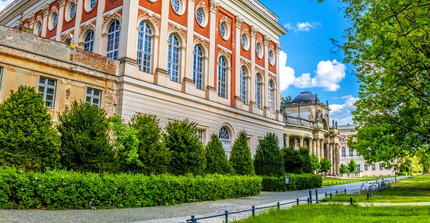Dr. Pierre Clavier
UP Reconnect Guest: Dr. Pierre Clavier
Visiting from: France
Home Institution: Université de Haute Alsace
Host at the UP: Prof. Dr. Sylvie Paycha
Institute at the University of Potsdam: Institute of Mathematics
Time of the visit: October – November 2023
Dr. Pierre Clavier is a mathematical physicist and works on questions related to algebra and quantum field theory. Currently he works as an assistant professor at the Univeristé de Hauta Alsace in Mulhouse, France. In this interview, he speaks about his path into science and his current research project “species theory”.
Dear Pierre Clavier, you came to us at the University of Potsdam from France. How did the connection to Potsdam come about? How do you see the German-French relations in your field of research?
The connection came through Prof. Dr. Paycha which I met at a weekly seminar she sometimes intended while doing my PhD. At the end of it, I reached out to her to ask for the possibility to work in her research team and she offered me a position. Since then, I have been back to France but we are still working together. Regarding the second question, I believe that national questions play quite a small role in research, apart from visa issues. Since our countries are neighbours and in the UE, there are many ties between them, but I don’t know if it’s specific to France and Germany.
Could you tell us what made you decide to become a mathematician in the first place?
As a child, I wanted to be a physicist. While studying, I realised that I was better at and enjoyed much more theoretical aspects of physics. In conclusion, I did my PhD in theoretical/mathematical physics. During these years, it became clear that the most interesting questions in the field I was working on were mathematical ones, so I leant more and more into this direction. It came to me quite naturally and was never a specific decision.
Can you shortly describe the project you are working on during your stay with UP Reconnect? And what are the advantages for you being in Potsdam for the project?
We are working on “species theory”, a theory that studies how one can give structures to sets. Our goal is to unify with this approach various combinatorial results that somewhat feel related although they live in quite different words. I was extremely advantageous to be in Potsdam for this. First, doing research is far better in person than doing it remote. We could discuss lots and make many progresses. Some of our initial questions have been answered and now we do have a much clearer idea of where we want to go concerning the remaining ones. Furthermore, I think that Potsdam is a great place to meet: there is quiet, nature, and the math department is very pleasant to work in!
That sounds great. How do you plan to continue the collaboration in the future?
We have a bunch of online meeting fixed until Christmas 2023: our hope is that at this moment we’ll be not too far from finish the redaction of a paper. In the meantime, we have also unlocked some new research directions, which could be explored in future meetings, maybe in France, Potsdam or elsewhere.
You mentioned your interest in gender issues in mathematics and physics. How do you think improvement could be made in this field?
That is a complicated question! There are many aspects that I think are quite substantial. First of all activities for high-school pupils to motivate more female students to study math. But also historical work to shed light on some women whose work has been unfairly brushed over or “Mathilda effected” [a bias against acknowledging the achievements of women scientists whose work is attributed to their male colleagues]. I also really enjoy the conference “Women in [...]” where all speakers are women. It makes a great conference and builds a momentum. It could also be a career booster for young female scientists that are struggling. On a simpler note, I think that male mathematicians have a role to play, maybe by trying to repress misogynistic biases that might exist in them or in older colleagues. This is not an easy task. In the end, I am not someone that should be giving lessons on this domain where I am far from perfect.
Thank you for this interesting interview and we wish you all the best for the future!


